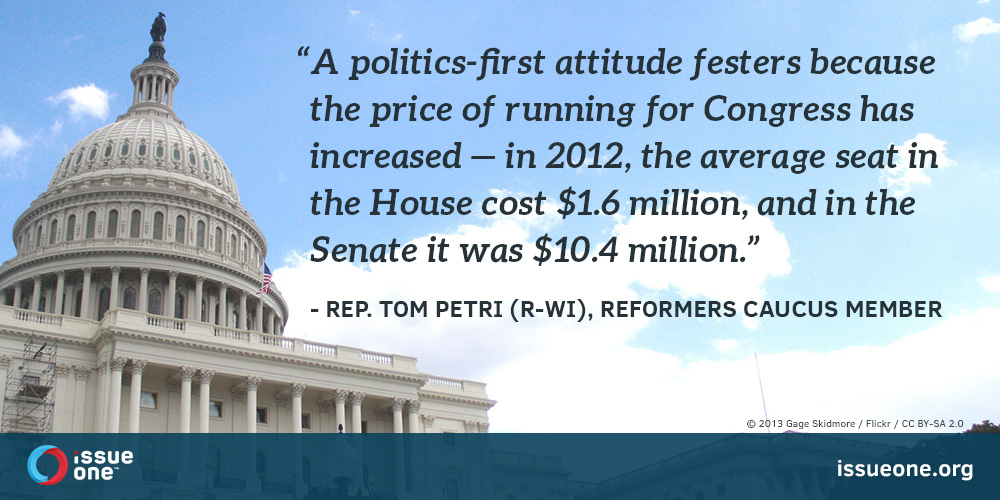Op-eds
Rep. Tom Petri blasts congressional fundraising

This op-ed originally appeared in the Wisconsin State Journal.
Americans have witnessed another year of divided Washington in action — or should I say inaction.
This year the gridlock is over guns and Supreme Court nominees. When I served in Congress it was over whether to raise the minimum wage.
The burden of governing is heavy and not meant to be easily cast aside. For the benefit of our country, a functioning government requires compromise.
I know finding common ground is difficult because when I served as the ranking Republican on the Labor Standards Subcommittee in the House, we were confronted with the need to decide whether to increase the minimum wage, an issue that came up every five or six years.
As Republicans, we prefer to keep government’s heavy hand out of business, and sought an alternative to a one-size-fits-all pay increase. Our staff scoured all the debates over the minimum wage going back to the 1930s, trying to find a solution that would not hinder the average small business person, but instead help the poorest in our communities. What we devised after months of back and forth discussion between our colleagues was what became the modern earned income tax credit. It was a commonsense, bipartisan victory for both parties and average Americans.
But today, and for the past few election cycles, Congress has barely functioned. It is hopelessly gridlocked by a culture in the Capitol that has prioritized politics and fundraising over the hard work of governing.
Take House Democrats for example: In June they sat in the House chamber for more than 24 hours to demand Congress take action on a package of proposed gun measures following the tragedy in Orlando, Florida. They continued their push this month, lining up with images of victims of gun violence one after another on the House floor. While these actions may play well with their voting base, they will not succeed in bringing conservatives to support their proposed legislation. What a missed opportunity.
On the other side of the aisle, rank-and-file Republicans have to walk a fine line between Speaker Paul Ryan, R-Janesville, and his tussles with the House Freedom Caucus. Republicans in Congress voted to overturn Obamacare in part or whole dozens of times, but recently Speaker Ryan told Jake Tapper on CNN, “Our goal was not to pass a replacement of Obamacare when the guy in the Oval Office is named Obama.”
While Democrats and Republicans both support fixing the health care law, and have passed legislation to do so, they still treat it like a political football. Even the success of a bipartisan bill to combat opioid addiction is overshadowed by politics.
Every example I’ve defined above is a case study in politics. Now that may be a natural part of a healthy democracy, but it has replaced our functioning government. The so-called game of politics lacks the grit of compromise, of finding middle ground, of doing what is right for your constituents in concert with your fellow lawmakers.
But that is not how things work today. A politics-first attitude festers because the price of running for Congress has increased — in 2012, the average seat in the House cost $1.6 million, and in the Senate it was $10.4 million. To raise that money, and fend off hundreds of millions of dollars in spending by outside groups, the average member of Congress dedicates four and five hours a day dialing donors or attending fundraisers. That is time they are not sitting down with fellow lawmakers, attending committee meetings or addressing the most controversial and pressing issues facing our country.
Americans have had enough of business as usual: In a recent poll, 72 percent of Americans — including 81 percent of Democrats and 79 percent of Republicans — said their lawmakers should work together to reduce the influence money has in our politics and government. Even when bipartisan support exists for overhauling the dysfunctional Federal Election Commission, our nation’s election watchdog, or protecting our elections from foreign influence, most members of Congress shy away.
Speaker Ryan said, “We can’t just talk unification, we have to act toward unification.” I couldn’t agree more: It is up to Congress to renew Americans’ trust in the institution of government. It doesn’t take such extreme actions as sit-ins and government shutdowns for our lawmakers to get back to work, merely less time spent fundraising. I hope that following some self-reflection during the August recess, other members of Congress will rise to the challenge of governing.
Petri was a U.S. representative for Wisconsin’s 6th Congressional District from 1979 to 2015. He is a member of the ReFormers Caucus of Issue One, a nonprofit dedicated to reducing the influence of money in politics.
Issue: ReFormers Caucus
